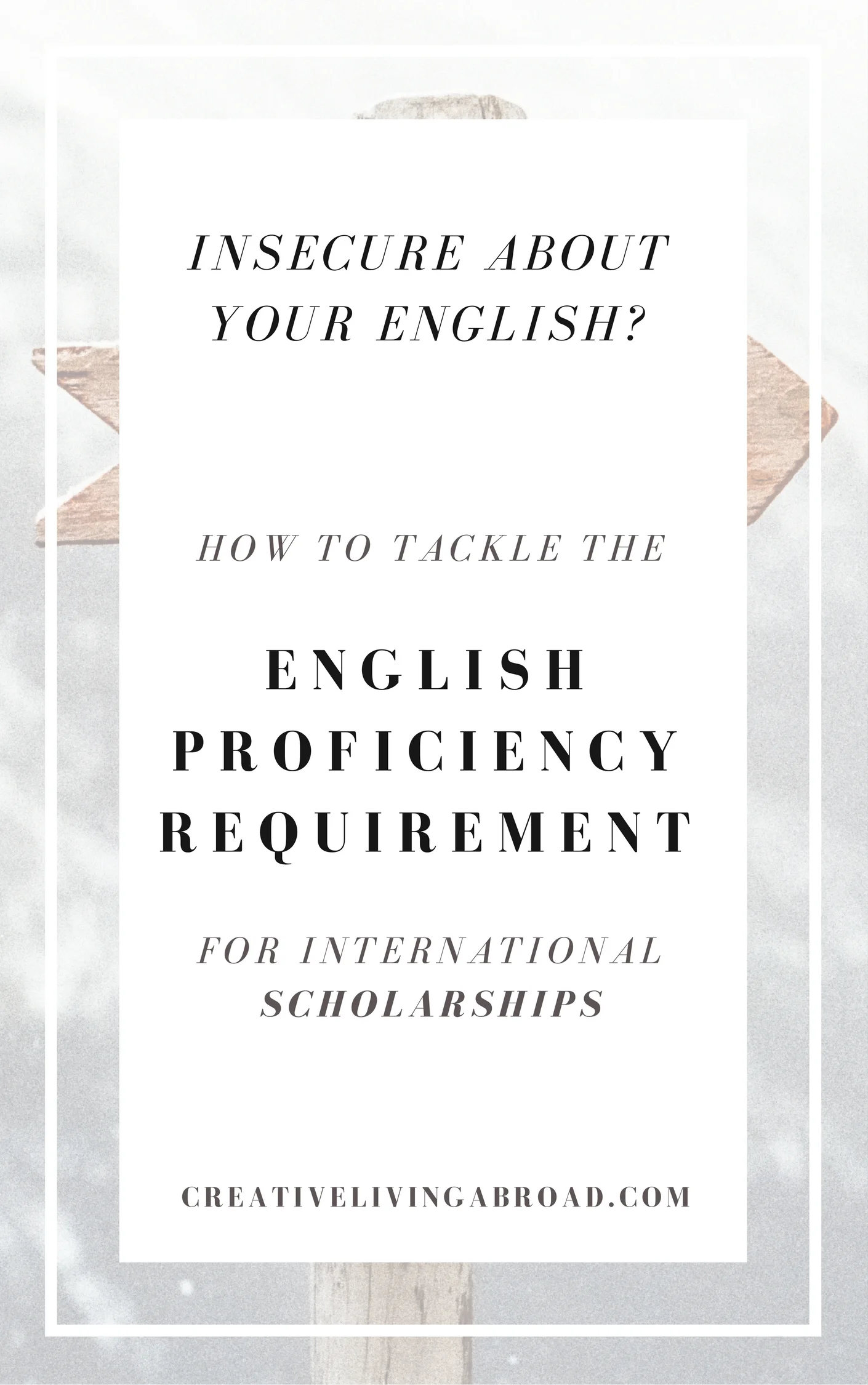How To Tackle The English Proficiency Requirement For International Scholarships
Are you one of those aspiring to bag a study abroad scholarship? You must know that one of the things that put people off when applying is the fear of not meeting the language proficiency requirement. Although not always the case, most international programmes require a good level of English... and for a couple of reasons. Firstly, grant judges use it as a filter to manage the high volume of applications they receive. Secondly, it also ensures that you can participate adequately in class discussions.
While some would argue that using English as a default language in global contexts can result in exclusion and unequal power distributions, there's no denying that applicants have to grapple with this requirement. So what can you do if you don't feel confident about your English language skills?
Don't give up just yet. Not all past and present scholarship holders have flawless grammar and excellent command of the language. This is just one of several considerations and definitely not the end-all and be-all of your application. Besides, there are many ways to improve your English skills, so all hope is not lost.
If you're looking into applying for an international scholarship in the near future and are keen on improving your chances, then here are some tips on how you can improve your language skills and tackle the language proficiency requirement in your application.
One: Check if this requirement can be waived.
The English proficiency requirement will most probably be required from you if you fall under the non-native speaker category. Of course, there are many ways to interpret one's nativeness, but this often means that you're from a country that's not the US, Canada, UK, Ireland, Australia, or New Zealand.
If you're a non-native speaker but you completed your bachelor's studies in English, then call or send an e-mail to the grant body if they can waive this requirement and if you can submit a Proof of English as a Medium of Instruction issued by your university instead. It worked for some of my scholar friends, so it's worth a shot.
If none of these conditions apply to you, then you most probably will need to take a language proficiency exam.
Two: Figure out the language proficiency exaM accepted by your programme of choice and start preparing.
It's one thing to know English and it's another to actually pass the exam. You see, getting your target mark has a lot to do with getting acquainted with the exam format.
The two most popular requirements for study abroad scholarships are the IELTS Academic Test (there's another one called IELTS General Training) and the TOEFL. The basic difference is that IELTS is mostly required for institutions in Australia, the UK, and the rest of Europe while North American institutions require TOEFL. While there are important differences between these tests, they are generally divided into four categories: Reading, Listening, Writing, and Speaking. Both IELTS and TOEFL are available in paper- and computer-based formats.
They cost money, so alongside your exam preparations, it's also good to know that some financial investment is involved. Check out the following websites for more information and to find a test location near you:
When I was preparing to take the TOEFL exams, I met up regularly with a friend, devoured the TOEFL practice book over coffee and food, and recorded myself answering the Speaking practice tests. I had also always been a heavy reader, so I picked up vocabulary and expressions that way.
If you'd like to get serious about taking these exams, I suggest that you look up practice tests online and grab the official test prep books:
Three: Evaluate your skills through subjective and objective means.
Really think about your strengths and weaknesses, especially when it comes to academic English. It pays to know some slang and have the ability to engage in small talk, but your application will most probably be evaluated on the basis of your command of the English language in an academic setting.
You'll most likely be a good judge of your own skills and it's normal that you'll fare better in some and worse in others. In my case, reading and writing are my strongest points but I just suck at listening and get terribly nervous when speaking. Knowing your strong and weak points will help you budget your time and effort appropriately and choose the right activities to practice and improve in the language.
If you're looking for more objective means to gauge your level, I'd recommend checking out Oxford's free online level test. It's got grammar, listening, vocabulary, and reading tests to help you discover your strengths and weaknesses. For IELTS, head over to Examenglish's level test and Testden for TOEFL (you'll be asked to register your email address, however).
Now that you've got a general idea of where your English skills are at, I suggest looking for resources and mock exams online. I'd also advise mixing in review content from IELTS's and TOEFL's official review books. You can check them out on Amazon here for IELTS and here for TOEFL or at your local bookstore.
You can also check out these free practice tests online:
FOUR: Draft a one-year plan to improve your language skills and commit to it.
I've been studying foreign languages all my life (my native tongue is Tagalog), and you sure would agree that it takes a whole lot of effort, time, and meaningful engagement with the language to see results. I'd even say that it takes a lifetime... and there's always something more to be learned.
But we don't have a lifetime to wait to apply for a scholarship. So commit to an intensive, one-year plan to improve your skills by engaging with the language every day.
Some ways you can improve your English skills include:
Read academic journals at least once a week on your topic of interest. Pay attention to the structure, tone, and the words and phrases used. Go check out this amazing resource from the University of Manchester that walks you through the commonly used phrases in academic writing. I swear by this and it did help me improve my writing style!
Watch movies, documentaries, Ted-X talks, and even YouTube video tutorials in English. If you need to put subtitles on, so be it!
Read news and academic blogs in English. This can increase your vocabulary and help you be attuned to the formal tone and flow of writing.
Have a notebook ready solely for new words and phrases that you come across. At the end of the day, spend a couple of minutes to go through your list and try to use them in context. You can also look up some synonyms and write them beside it. Then do that the next day, and the next. This increases your retention of the words and phrases.
Subscribe to podcasts in English via iTunes. Fluentu has come up with a good list here. This has been one of my favourites to pick up new vocabulary. Find a topic you're genuinely interested in and you'll surely find yourself learning in a fun way. My go-to podcast is Tsh Oxenreider's The Simple Show: certainly my pocketful of sunshine!
You can also set up your own blog to practice writing about topics you care about. It can definitely help you engage in the mental exercise of stringing words and phrases coherently and writing for an audience. There are many free platforms out there wherein you can set up a blog in 5 minutes. I'd used Wordpress for my hobby travel blog back then and it worked for me.
If you have some money to spare and you really need a focused approach to your language learning, then private classes would do the trick. I have heard rave reviews about the platform iTalki, wherein you can scout for qualified and experienced teachers to help you out with your language goals based on your budget and availability. There are classes for as low as 8 USD/hour. What's more, you can progress with the language in the comfort of your home.
Get a language exchange partner through conversationexchange.com.
FIVE: Have a colleague or trusted mentor check and edit your written outputs when submitting your application.
Have you ever experienced being too thick in the trees to see the forest? This is when a colleague or mentor could save your life. Working on something repeatedly makes us oblivious to errors, so an extra pair of eyes sure won't hurt. You can also request a professional (like your iTalki teacher or a proofreader) to do this for you.
SIX: Highlight your other strengths in the application if English is not one of them!
We're all endowed with different talents, and some people take less effort learning languages than others. If English is not one of your strong points, fret not. Scholarship evaluators do look at the whole package, so make sure to highlight your outstanding marks, extensive work experience, your profound interest and knowledge on relevant topics, and your valuable soft skills like leadership and project management skills. Language skills are not a you-have-it-or-you-don't thing, so there's definitely plenty of opportunities to improve it later on. What's more, embarking on a study abroad experience may just be what you need to get you started on that.
Over to you. How have you been preparing for the language requirement of your scholarship application? Have you got any helpful tricks up your sleeve? Let us know in the comments below!
Hugs,
Icy
**Author's note: This post contains affiliate links. Please read our affiliate disclosure page for more info.
Other posts you might like:











